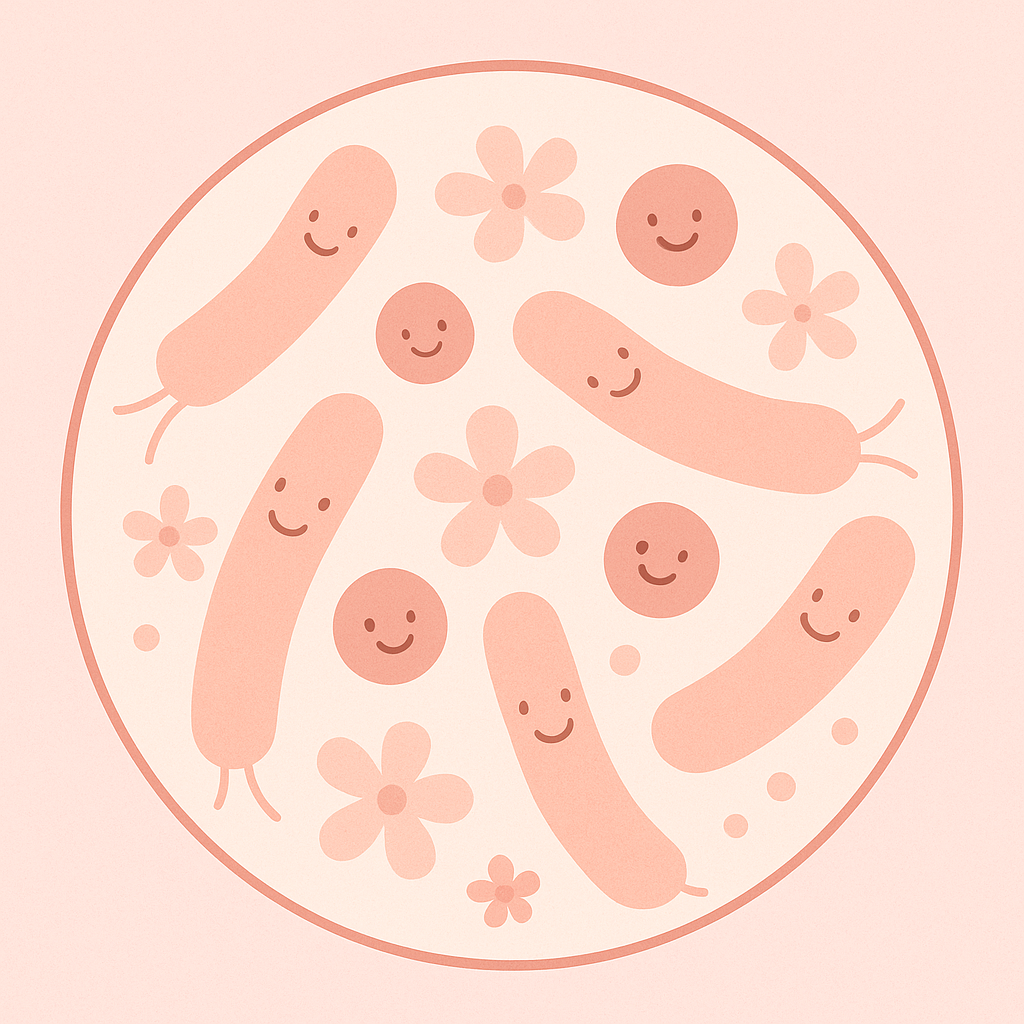Recurrent vaginal infection? Restoring the vaginal flora may be the solution!
Recurring vaginal infections make your everyday life miserable, which recurs again and again, no matter what you try? Maybe you have been dreaming about having a child for a long time, but the baby is waiting for you and the question has arisen in your mind, what could be in the background? Or are you worried about an unexpected finding, such as an HPV test result? If any of them sound familiar, know that you’re not alone. Many women face similar challenges throughout their lives and are looking for solutions to unpleasant symptoms or long-standing problems.

We often don’t think about it, but behind these challenges there is often an invisible, microscopic world, a complex community of tiny inhabitants of your vagina: the vaginal microbiome, or more commonly known as the vaginal flora. Imagine this area as a highly sensitive and carefully balanced ecosystem where millions of tiny organisms, mainly bacteria, live together. This microbial community is quite unique in our body. For example, while our gut flora is home to a wide variety of bacteria – and diversity is good there – a healthy vagina is predominantly dominated by members of a single bacterial genus, Lactobacilli (or “lactic acid bacteria”).
But why is this Lactobacillus dominance so important? These beneficial bacteria are the primary line of defense for your intimate health. They produce lactic acid, which is key to maintaining the acidic pH of the vagina. This acidic environment is extremely unfavorable for most pathogenic bacteria and fungi, thus forming a natural protective shield against infections. They are like an invisible guard that vigilantly guards your health, keeping unwanted intruders at bay. When this delicate balance is upset and the number of Lactobacilli decreases, the defense is weakened and can open the way for various problems.
If this delicate balance is upset, it is called dysbiosis. There are several factors that can contribute to this imbalance:
- Antibiotic treatments: While they can be essential in fighting certain infections, antibiotics are indiscriminate – they can kill beneficial Lactobacilli in addition to pathogens.
- Hormonal changes: Pregnancy, menopause, or even the natural fluctuations of the menstrual cycle can also affect the vaginal environment.
- Stress: Long-term stress can weaken the immune system, which can also indirectly affect the composition of the microbiome.
- Inadequate intimate hygiene: Excessive hygiene, especially irrigation (vaginal rinsing), washes out the beneficial bacteria. At the same time, neglected hygiene also favors the reproduction of pathogens.
- Sexual intercourse: In some cases, they can affect the pH value and introduce new microbes into the vagina.
- Other factors: Smoking, certain contraceptive methods, or even wearing inappropriate synthetic underwear can also contribute to dysbiosis.
When the protective shield of Lactobacilli is weakened, the pH of the vagina rises and the “bad guys” – the pathogens – can multiply more easily. This can lead to a number of unpleasant and often recurring problems:
- Bacterial vaginosis (BV): It is caused by an overgrowth of anaerobic bacteria (e.g. Gardnerella), and its characteristic symptom is an unpleasant-smelling, diluted discharge. Although bacterial vaginosis is treated with antibiotics, recurrence is common because the basic Lactobacillus deficiency is often not resolved.
- Vaginal yeast infection (VVC): It is triggered by the proliferation of the Candida fungus, accompanied by severe itching and curd discharge. Vaginal yeast infection is treated with antifungal agents, but recurrence can also be typical here if the balance of the flora is not restored.
- Common urinary tract infections (UTIs) / Colds: Due to the lack of protective flora in the vagina, intestinal bacteria (e.g. E. coli) can enter the urinary tract more easily. Therefore, in addition to treating frequent urinary tract infections or frequent colds, it can also be important to support the vaginal flora.
- Fertility problems and infertility: An upset flora can negatively affect the chances of getting pregnant, sperm viability and IVF success. When treating infertility or treating fertility problems, the optimization of the vaginal flora is also an important aspect.
- Slower clearance of HPV infection: An unbalanced microbiome can slow down the process of removing the HPV virus from the body.
So it can be seen that the imbalance of the vaginal microbiome goes far beyond temporary discomfort. It can lead to more serious health problems, a deterioration in the quality of life, and make it difficult to have children. Although symptomatic treatments (antibiotics, antifungals) are important for solving the acute problem, they are often not enough on their own for a long-term solution. In order to break the vicious circle of recurring problems and ensure long-term well-being, it is essential to treat the root cause, i.e. to restore the vaginal flora. The health of the vaginal flora depends on the fragile balance of Lactobacilli, but according to the current state of science, there are real “key players”, specialists within this beneficial bacterial team, who play a prominent role in maintaining optimal condition. A series of studies prove that the healthiest vaginal condition is characterized by a predominance of Lactobacillus crispatus.
Why is Lactobacillus crispatus the star?
This specific species is the most efficient at producing “protective” lactic acid, which has been shown to provide stronger protection against pathogens than other forms of lactic acid by helping to maintain a healthy, acidic environment in the vagina, thereby preventing infections. Its presence is closely related to a lower risk of vaginal infections (such as bacterial vaginosis or vaginal fungus), a lower incidence of urinary tract infections, faster HPV clearance, and better fertility indicators. So, if the goal is to restore the vaginal flora, it seems a logical step to replace this extremely important bacterium in a targeted manner. But how can we ensure that this beneficial bacteria reaches where it is most needed and can work efficiently?
This is where the Crispact® vaginal flora restoration dietary supplement comes into play. Crispact® is not just one generic probiotic among many. It is a modern, scientifically developed, precision formulation that has been specially developed to support women’s intimate health. It contains a single, carefully selected and thoroughly studied bacterial strain: Lactobacillus crispatus M247.
What makes the M247 fuselage special?
- Scientifically proven effect: It is one of the most thoroughly studied strains of beneficial bacteria that can help prevent vaginal infections, reduce the chance of recurrence, and also support pregnancy.
- Safe to use: It is an officially registered strain that does not contain any harmful properties.
- Get where you need it: It can survive through the digestive tract, so it can reach the vagina when taken orally, where it can attach.
- Natural protection: It helps maintain a healthy vaginal environment and repels pathogens.
- It can be combined with treatments: It can also be used in combination with certain medications to support faster healing and the prevention of recurrent infections.
Crispact® thus provides targeted support for the restoration of the vaginal flora by delivering Lactobacillus crispatus, a key player necessary for the healthiest vaginal condition (CST I), in the form of a clinically proven and safe strain (M247).
Practical application of Crispact®:
Crispact® is easy and convenient to use. It is available in the form of oral sachets or capsules, so it does not require topical application. The recommended dosage is 1 sachet or capsule per day. In order to achieve long-term results and to develop a stable healthy flora, it is recommended to take the product regularly for at least 3 months. Crispact’s® bacteria retain their viability for a long time when stored in the refrigerator (+2°C to +8°C) – so you can be sure that it will remain effective and reliable for a long time.
Why choose targeted support?
As we have observed, the imbalance of the vaginal flora can lead to a number of unpleasant and recurring problems, and in the background there is often a lack of Lactobacilli, especially Lactobacillus crispatus.
By containing a large number of the clinically proven Lactobacillus crispatus M247 strain, Crispact® helps directly at the root of the problem:
- It supports the restoration and maintenance of the vaginal flora.
- May contribute to the prevention of recurrent vaginal infections
- May reduce the risk of common urinary tract infections
- Can provide support in the treatment of fertility problems, improving the chances of conception and the success of IVF procedures
- May promote faster clearance of HPV infection
Important Notice:
Although Crispact® is effective in supporting intimate health, it is important to emphasize that it is a dietary supplement. It is not a substitute for necessary medical examinations, an accurate diagnosis or treatments prescribed by a doctor. If you have symptoms (e.g. unusual discharge, smell, itching, pain) or any health problems, always consult your doctor or gynecologist.
Take the first step!
Your intimate health is valuable and deserves the most up-to-date, scientifically based care. If you feel that restoring the vaginal flora can be key to solving your problems and you want to do targeted action for long-term balance, try Crispact®!

